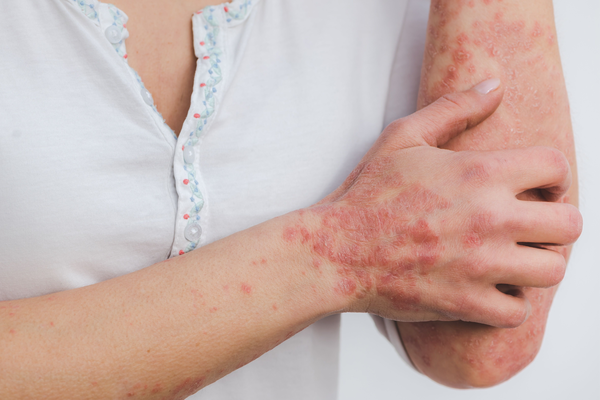Psoriasis is a common chronic autoimmune skin condition that involves the abnormal growth of skin cells that leads to a nasty skin cell buildup. This causes inflamed, itchy, and scaly patches on the skin.
There can be several reasons why a person suffers from psoriasis. Although experts believe it is mostly caused by genetics, there are also specific environmental triggers that cause a flare-up.
In this article, you will learn what psoriasis flare-ups are, what triggers them, and what you can do to avoid them.

Understand what triggers your flare-ups
Psoriasis flare-ups can happen any time.
While flare-ups can occur randomly, they can also occur due to other specific triggers. To prevent this from happening, it is important to understand why they happen and what you can do to make it better.
Not all cases of psoriasis have the same reaction to the same triggers. In fact, the severity or reactions of the flare-ups differ from person to person.
Here are common factors that trigger a psoriasis flare-up:
- Stress
Stress is one of the most common triggers for psoriasis flare-ups. Researchers are still unsure what makes stress a trigger for a flare-up, but evidence suggests that both psoriasis and stress are linked to each other.
- Cold and dry weather
Cold and dry weather is also a common trigger for psoriasis. As the weather gets darker, colder, and drier, moisture is sucked out of the skin making it drier as well. This leads to many complications other than itching, such as cracking, bleeding, and even infection.
- Medications/Allergic reactions
Some medications can cause allergic reactions, and worse, psoriasis flare-ups. They can also affect the severity of the flare-up such as adding more spots to the skin or worsening the spots that are already existing.
To know which medications to avoid to prevent psoriasis flare-ups, consult your skin specialists or dermatologist.
- Diet and alcohol
Diet can also affect psoriasis flare-ups. To prevent the worsening of psoriasis, stay away from food and drinks that can potentially make the symptoms worse such as refined carbohydrates, dairy, processed sugars, and alcohol.
- Skin trauma
In some cases, skin trauma such as bruises, cuts, burns, and tattoos can also cause a psoriasis flare-up. Basically, new patches may start to appear when you hurt or irritate your skin. Experts call this the Koebner Phenomenon.
Also read: How To Use Salicylic Acid For Skin Care : Benefits and More
Track your symptoms
Monitor your symptoms before you go to your doctor. Flare-ups can present differently from time to time so take note of how the patches look or feel.
Is it red or purple? Are they cracked and bleeding? Is it painful? Do they subside right away?
Understanding how your psoriasis flare-ups behave makes it easier for your dermatologist to make a proper diagnosis and prescription. Don’t forget to be honest about what you did or ate that may have triggered the flare. This adds additional information that may be useful for your doctor’s notes.
Adjust your treatment plan
According to a study from the British Journal of Dermatology, 50 percent of psoriasis patients stopped using their topical treatment within a year.
Sometimes your current medication is no longer effective or strong enough to manage your symptoms, so a change in your treatment plan might be the next best option.
Before you decide on changing your treatment plan, consult your dermatologist to evaluate your skin and provide you with an updated treatment plan.
Try to calm down
A psoriasis flare-up can be incredibly stressful, especially when it’s itchy and uncomfortable. Unfortunately, stress can also aggravate the flare-up. It’s basically a two-way street. Stress causes psoriasis flare-ups, while psoriasis flare-ups can also cause stress and anxiety.
To calm down and give your flare-up the chance to subside, take deep breaths and focus on something else other than your skin. You can meditate, work out, or get a massage to release tension from your body.
Talk to your doctor about prescribing a second type of medication for tougher flare-ups.
If you still can’t find the solution to tame your psoriasis flare-ups, it’s best to talk to your doctor or dermatologist for the best treatment plan.
Oftentimes, healthcare providers prescribe stronger creams, ointments, or medications for stubborn psoriasis flare-ups, when the current prescription no longer works as well as before.
Do not take psoriasis flare-ups for granted
How long psoriasis flare-ups last really just depends on how well your body reacts to certain medications or rest. Most of the time, flare-ups can subside within a few weeks, however it can also last until a few more months.
Flare-ups can be uncomfortable, itchy, and sometimes even painful. This is why it is important to learn how to treat it effectively so it doesn’t get in the way of your normal daily activities. Talk to a trusted dermatologist to discuss better options to manage your psoriasis.


